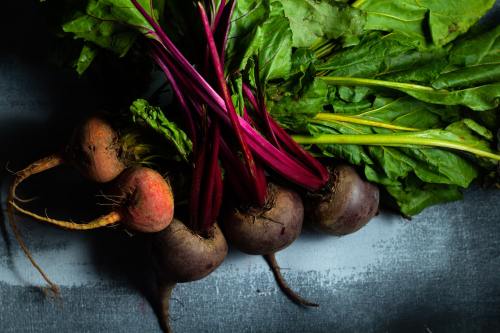
As winter approaches, there’s sometimes a rush to get all your vegetables harvested and stored in time. Produce left out in the garden during winter can rot or develop frost damage quickly, but is that true of all vegetables? Some gardeners choose to leave beets, as well as other vegetables, in the garden through winter. Is this a wise decision? What are the potential benefits and drawbacks of overwintering your beets like this? Here’s everything you need to know about how to store beets for the winter.
Can you leave beets in the ground over winter?
Yes, beets can stay underground through winter. Several other root vegetable plants, including parsnips, turnips, and carrots, can also be left underground. In most cases, they will last just fine without significant damage. However, there’s still a slight risk of rot or frost damage. Leaving beets underground during winter, also known as overwintering, is better suited for vegetables planted in the fall.
Beets planted before August will likely be ready for harvest before winter, and won’t benefit as much from overwintering. If you’re growing beets for the greens, you should harvest them before winter. The leaves typically die back or are heavily damaged during winter. The benefits of overwintering beets are only for the root vegetable itself.
What are the benefits of overwintering beets?
There are a few different reasons why overwintering beets is a good idea. For starters, it extends the growing season, which also extends your harvest. Rather than relying solely on vegetables that you stored yourself, or supplementing with store-bought vegetables, you can have a fresh harvest of beets throughout winter and the beginning of spring.
The second reason to consider overwintering your beets is that it can improve their flavor. Beets that haven’t been overwintered are delicious and versatile, but beets that stay in the ground through winter become significantly sweeter. This is due to a process called chill-sweetening. Other root vegetables, such as carrots and turnips, can undergo the same process. When the temperature drops closer to freezing, the plant begins converting starches into sugars. This helps keep the plant from freezing, but it also results in sweeter, crunchier beets.
When should you not overwinter beets?
Although overwintering beets can be fun and beneficial, it isn’t for everyone. Overwintering beets works best in mild to moderate winters, with temperatures at or above 30 degrees Fahrenheit. Climates with more severe temperatures, especially places where the thermometer regularly drops below 25 degrees Fahrenheit, are more likely to see damaged beets. Adding a layer of mulch can help somewhat, but it still isn’t enough to protect the beets entirely from temperatures below 25 degrees Fahrenheit.
On the other hand, regions that see little to no decrease in temperature during winter have the opposite problem. You can leave your beets underground during winter without issue. However, you aren’t likely to see any chill-sweetening. You may be able to artificially induce chill-sweetening by placing potted beet plants into a refrigerator or freezer. However, keep in mind that potted beets have less soil to insulate them, so they’re at a higher risk of frost damage.
Are beets annuals?
You can typically grow beets between zones 2 and 10. To be specific, beets are biennials, which is to say that they complete their life cycle every two years. Most of the time, home gardeners will grow beets as annuals and harvest them within the growing season. If you live in climate zone 9 or warmer, you can grow beets over winter without taking any careful measures. That’s to say, you’ll be able to enjoy beets (and their greens) all year round. Gardeners in these warm regions can even plant beets by mid or late fall for a delicious winter harvest.
When should you harvest your overwintered beets?
When it comes to choosing a harvest time for your overwintered beets, there are several things to consider. To begin, if your winter temperatures stay in the 30s and don’t drop below 25 degrees Fahrenheit for more than a day or two in a row, you can harvest your beets at any time you like. You can even leave them until spring! However, when the temperatures begin to warm up, watch your beet plant for signs of new leaf growth. Once it begins growing more leaves, the beet itself can dry out and harden, making it unpleasant to eat.
If you live in a colder climate zone, you should harvest your beets before the temperatures drop below 25 degrees Fahrenheit consistently. Keep an eye on your local weather forecasts. If you see a hard freeze in the near future, you should bring your beets in to avoid potential cold or frost damage. However, you can still get the benefit of chill-sweetening from a partial overwintering.
Now that all your questions about overwintering your beets have been answered, you can enjoy all the crisp, sweet beets you can fit in your garden! Overwintering beets is easy, especially if you have mildly cold winters. Although it can seem intimidating to let your beets stay out in the cold, you’ll benefit quite a bit from it. Just remember to keep an eye on the weather, and bring them in if it gets too cold.
Editors' Recommendations
- Hardening off your seedlings as you bring them outside is crucial – here’s how to do it
- Zone 10a planting guide: Here’s what you need to know about what you can plant
- Is a cucumber a fruit or a vegetable? The answer might surprise you
- Do tomatoes need full sun to thrive? What you need to know
- Where is the avocado growing zone? Here’s where avocados grow best